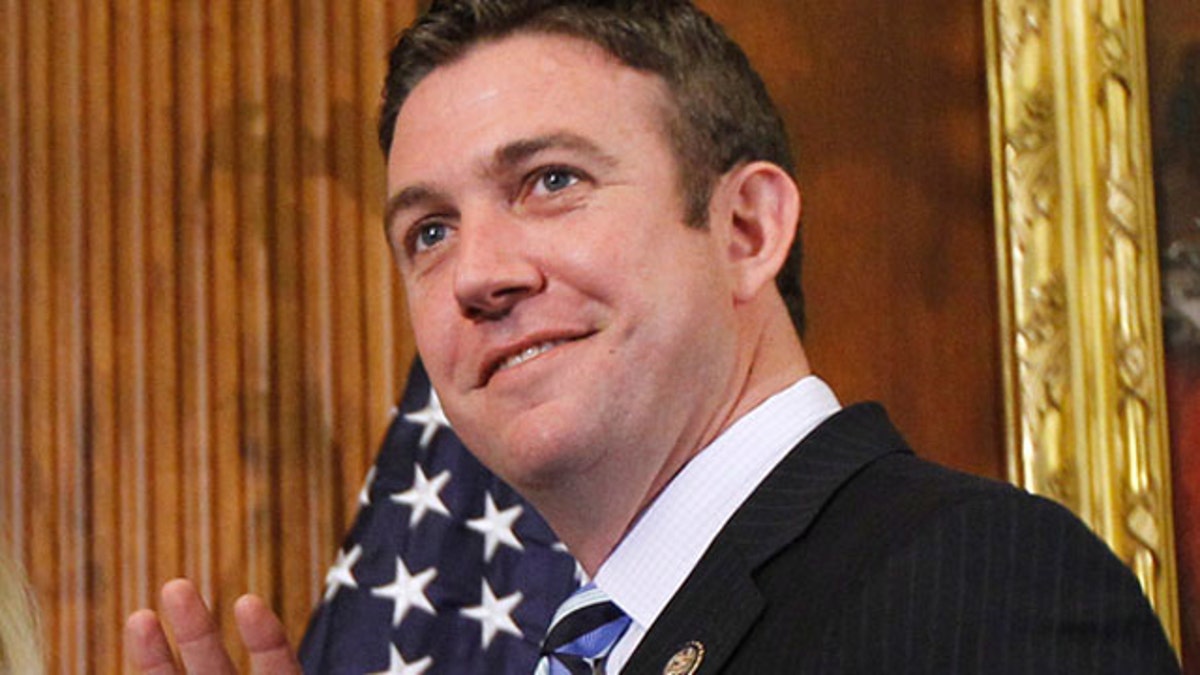
Not so fast on that César Chávez ship, Navy!
That's what a California Republican expressed about the Navy's consideration of naming a cargo ship after the famed labor leader.
Rep. Duncan Hunter, who is a member of the House Armed Services Committee, said the decision would be unfair to military war heroes.
"Naming a ship after César Chávez goes right along with other recent decisions by the Navy that appear to be more about making a political statement than upholding the Navy's history and tradition," said Hunter, only a week after another spat he had with the Navy over its decision that would have allowed chaplains to perform same sex-unions in states where gay marriage is legal.
The Navy abruptly reversed that plan last week after coming under pressure from lawmakers.
Navy official have not made their plans public yet, though Navy Secretary Ray Mabus is expected to announce the decision on Wednesday when he visits the facilities of General Dynamic NASSCO. The ship is being built there, in San Diego's mostly Hispanic neighborhood, Barrio Logan.
Hunter said a better choice for the last of the 14 Lewis and Clark-class cargo ships would be Marine Corps Sgt. Rafael Peralta, who was nominated for the Medal of Honor for action in Iraq — or World War II Medal of Honor recipient John Finn, a lifelong San Diego resident.
"If this decision were about recognizing the Hispanic community's contribution to our nation, many other names come to mind," said Hunter, a former Marine who served in Iraq and Afghanistan.
Navy officials declined to comment Tuesday on Hunter's remarks.
Sen. Barbara Boxer, D-Calif., said she called Mabus to thank him for naming the ship after Chavez.
"I applauded Secretary Mabus for continuing the Navy's rich tradition of naming these supply ships after pioneers, explorers and visionaries by honoring César Chávez, who worked tirelessly to promote fair working conditions and equal rights for all Americans," she said. "This is a fitting tribute to Chávez."
General Dynamics NASSCO spokesman, James Gill, said his company suggested the name to the Navy because it wanted to honor its mostly Hispanic workforce and Barrio Logan.
Chávez is credited with ending widespread discriminatory practices against the country's growing Hispanic population, especially in California.
Chávez led nationwide grape boycotts and mobilized tens of thousands of migrant workers, forcing growers to sign union contracts and respect labor rights. His movement pledged non-violence but struggled to keep from being dragged into bloody battles. He faced death threats and was called a Communist.
To this day, the hatred still runs deep among farmers who believe Chávez hurt California's agricultural industry.
Marc Grossman, a spokesman for the César Chávez Foundation, said he did not know Hunter's motivation in criticizing the decision. Grossman, who knew Chávez for 24 years, said he was a humble man who would have never wanted the spotlight.
"He was always uncomfortable being singled out for praise because he knew there were many César Chávezes — farmworkers who made great sacrifices and accomplished great things but who were unknown," he said. "So the Chávez family today acknowledges this honor in the name of all Latinos who have built this country and served this country in the armed services."
Chávez joined the Navy in 1946 and served two years before being honorably discharged, and two of his cousins were killed fighting in WWII, Grossman said. He died in 1993 at the age of 66. A year later, President Bill Clinton awarded Chávez the highest civilian honor, the U.S. Medal of Freedom, which was given to his widow.
NASSCO's other 13 Navy cargo ships — which shuttle provisions to combat ships supporting military or humanitarian missions — have been named after such notable Americans as explorers Meriwether Lewis and William Clark, and famed aviator Amelia Earhart. Chávez would be the first Mexican-American in that group.
Chávez's brother, son, grandchildren and Arturo Rodríguez, who replaced Chávez as president of the United Farmworkers of America, plan to attend the ceremony with Mabus on Wednesday, Grossman said.
Barrio Logan on San Diego's waterfront near the Coronado Bridge came about in 1871 when Congressman John A. Logan wrote legislation to provide federal land grants for a transcontinental railroad ending in San Diego. Logan's project never happened but a street in the area was named after him, and later the zone became known as Barrio Logan when an influx of Mexicans moved into the area after that country's 1910 Revolution.
Based on reporting by The Associated Press.
Follow us on twitter.com/foxnewslatino
Like us at facebook.com/foxnewslatino
